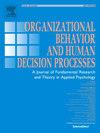On time or on thin ice: How deadline violations negatively affect perceived work quality and worker evaluations
IF 3.8
2区 管理学
Q2 MANAGEMENT
Organizational Behavior and Human Decision Processes
Pub Date : 2024-09-26
DOI:10.1016/j.obhdp.2024.104365
引用次数: 0
Abstract
Deadlines are a common feature of the modern workplace. While previous research has focused on how deadlines shape the behavior of those completing tasks, little is known about how deadlines may influence the judgment of individuals evaluating the submitted work. Through eight lab and field experiments, complemented by 10 supplemental studies (N=6,982), this investigation examines whether completing work early, on time, or late––independent of the quality of the work itself––influences perceptions of the quality of the submitted work and of the worker who submitted it. Results indicate that missing deadlines negatively influences evaluations of the worker and significantly diminishes the perceived quality of submitted work through a process of reductions in competence-related trust. This effect makes people less willing to work with late submitters in the future, and it is moderated by the perceived importance of the deadline and the reason for lateness. In contrast, submitting work early confers no benefit.
准时还是如履薄冰?违反最后期限如何对感知的工作质量和工人评价产生负面影响
截止日期是现代工作场所的一个常见特征。以往的研究主要关注截止日期如何影响完成任务者的行为,但对截止日期如何影响评估提交工作的个人的判断却知之甚少。通过八项实验室和现场实验以及十项补充研究(N=6,982),本研究探讨了提前、按时或延迟完成工作(与工作本身的质量无关)是否会影响人们对提交工作的质量以及提交工作的员工的看法。结果表明,错过截止日期会对工作人员的评价产生负面影响,并通过能力相关信任度的降低过程显著降低对提交工作质量的感知。这种影响会使人们在未来更不愿意与延迟提交者合作,而且这种影响会受到对截止日期重要性的感知和延迟原因的调节。相比之下,提前提交工作则没有任何好处。
本文章由计算机程序翻译,如有差异,请以英文原文为准。
求助全文
约1分钟内获得全文
求助全文
来源期刊
CiteScore
8.90
自引率
4.30%
发文量
68
期刊介绍:
Organizational Behavior and Human Decision Processes publishes fundamental research in organizational behavior, organizational psychology, and human cognition, judgment, and decision-making. The journal features articles that present original empirical research, theory development, meta-analysis, and methodological advancements relevant to the substantive domains served by the journal. Topics covered by the journal include perception, cognition, judgment, attitudes, emotion, well-being, motivation, choice, and performance. We are interested in articles that investigate these topics as they pertain to individuals, dyads, groups, and other social collectives. For each topic, we place a premium on articles that make fundamental and substantial contributions to understanding psychological processes relevant to human attitudes, cognitions, and behavior in organizations. In order to be considered for publication in OBHDP a manuscript has to include the following: 1.Demonstrate an interesting behavioral/psychological phenomenon 2.Make a significant theoretical and empirical contribution to the existing literature 3.Identify and test the underlying psychological mechanism for the newly discovered behavioral/psychological phenomenon 4.Have practical implications in organizational context

 求助内容:
求助内容: 应助结果提醒方式:
应助结果提醒方式:


